
The dos and don’ts of bar etiquette
Depictions of bartending in movies tend to alternate between scantily clad bartenders dancing on a bar to the one guy in the background polishing a solitary glass while listening to everyone’s problems. The truth, though, is that most bartenders are highly trained and efficient professionals who are there to provide a service—and neither of those things is in the job description. Hopefully, you know that. But do you know the bar etiquette rules of being a truly polite patron or the so-called polite habits most people dislike?
“Every bar has a different culture, so part of having good bar etiquette is understanding the vibe,” says Diane Gottsman, the author of Modern Etiquette for a Better Life and an expert on contemporary etiquette rules. “A lot of etiquette is learning to read the room. For instance, asking for a custom cocktail might be welcomed in an upscale bar, while it would be a huge inconvenience in a busy sports bar.”
Even if you steer clear of the obvious faux pas—like skimping on how much you tip—you may still flub the bar etiquette game. That’s because some seemingly polite habits aren’t quite as polite as you might think. And while bartenders may grin and bear it, it doesn’t mean they like it! Plus, these missteps can really get in the way of them doing their jobs. Read on to find out what to avoid and what to do instead with expert advice from Gottsman and Elaine Swann, an etiquette expert who has worked in hospitality.
Get Reader’s Digest’s Read Up newsletter for more etiquette tips, humor, cleaning, travel, tech and fun facts all week long.

Asking them to do a shot with you
This was the No. 1 “polite” habit that every single one of the bartenders we spoke with said they wished people would stop doing. “I get that you’re offering because you want to be nice and have me join in the party, but you’re on your own time, and I’m working,” says Lea Miner, a bartender at a restaurant in Colorado. “If I did a shot with every customer who asked, I’d be drunk in the first hour [of my shift].” She adds that most bars have a rule about bartenders not drinking on the job, but in her experience, “it’s 50/50 whether or not it actually gets enforced.”
The fact is, asking a bartender to join in on a round of shots puts them in an uncomfortable position and could even get them fired. “Not only does this put pressure on the bartender, but it can get them in trouble,” Gottsman says. “This may be your place to relax, but it’s their place of employment.”
Do this instead: Add the money you would have spent on the shot to the bartender’s tip, Gottsman says. Or, says Miner, if you want to buy them a drink, tell them to add one to your tab. That way, the bartender can choose to drink it after their shift is over.
Sure, there are some bars where this may be the culture, and in that case, it may be OK, Swann says. “The way to know is to simply ask the bartender,” she says. But if the answer is no, let it go.

Picking up your drink before they give it to you
A beer on tap doesn’t require any effort beyond filling the glass, but creating a cocktail is a work of art—and that includes final touches like a garnish. “I take a lot of pride in creating custom cocktails that don’t just taste great but also look beautiful,” says Miner, “and I want the guest to have the full experience.” However, many customers think the cocktail is finished after the liquid has been added, and while you may think you’re being helpful by taking it at that point, especially if the bar is busy, it takes away from that experience. It’s also rude—you’re literally grabbing something that’s still in the bartender’s possession.
Do this instead: “The bartender will signal to you that they’re ready for you to take it, either by handing or sliding the drink to you,” Gottsman says.
All you have to do is wait patiently. “Let me present it in an attractive way, complete with napkin and garnishes,” Miner says.
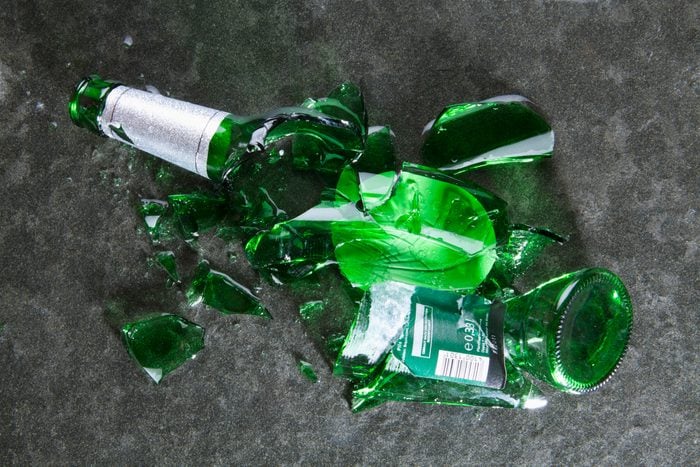
Cleaning up broken glass
Drop your drink? It’s OK—accidents happen. But think twice before getting down on the floor to clean it up. “Drunk people should never be in charge of picking up broken glass,” says Antonio Hernandez, a bartender at a speakeasy in Manhattan. You could cut yourself or injure someone else, and not only is that painful, but it’s also a liability for the club.
Do this instead: “Staff are trained how to handle these situations, and they have the supplies to do it,” Gottsman says. Politely alert staff to the problem, and let them take care of it.
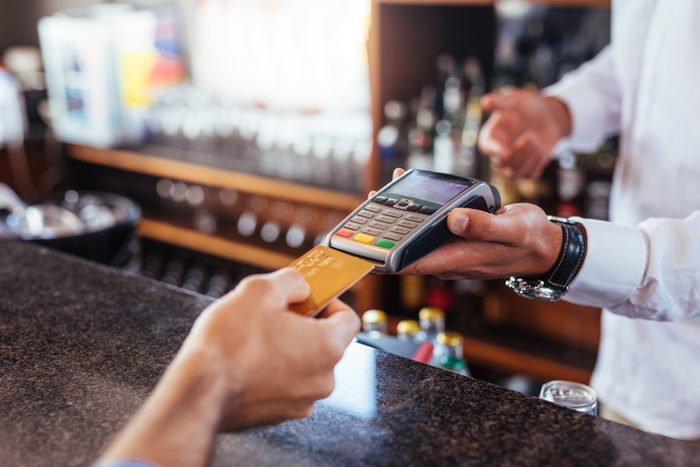
Itemizing and splitting a tab
It’s not uncommon for one person to start a tab for a whole group, and it’s a polite way to keep things simple for the bartender. But when you go to pay, things can get tricky. While it’s perfectly fine to ask them to split the tab equally between two or three credit cards, you shouldn’t ask your bartender to itemize the check by drink—for instance, asking them to charge Bob’s credit card for three beers, Jill’s card for two mojitos, Amir’s card for a glass of wine and a beer, and so on. “This is too complicated for us to sort out, especially during a rush,” says Mary Joe, a bartender at a sports bar in Minneapolis, who notes that this is also bad restaurant etiquette.
Do this instead: “Everyone should have their own tab,” Gottsman says. If you have a group tab, ideally, have one person close out the tab, and then the other people can pay that person.

Stuffing napkins, straw wrappers or other trash into your cup
“A lot of bartenders take great pride in keeping their bar area neat and tidy, so they do appreciate it when you clean up after yourself,” Gottsman says. Stuffing all the trash into a glass may look contained and tidy, but it actually creates more work—and can get gross. “Now I have to stick my fingers inside the used glasses and fish out soggy napkins,” Joe says.
Do this instead: “Dispose of your trash in a trash can if one is available and pick up items that fell on the floor,” Gottsman says. “Don’t stack glasses or plates, and don’t put things inside cups.”
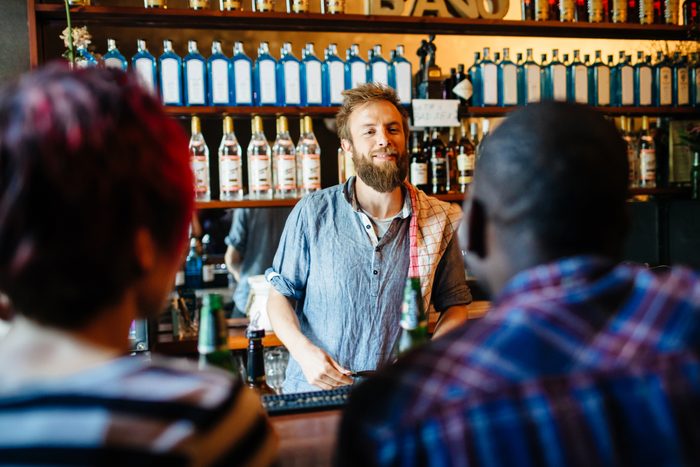
Telling them your life story
Bartenders are often seen as kind and sympathetic, and you may feel like it’s an honor to trust them with your problems. Plus, they could use the company, so it’s a win-win, isn’t it? Not exactly. For starters, they’re not therapists. And second, they’re working!
“Sometimes customers will sit and chat with me for my whole shift, insisting on keeping me company, telling me they don’t want me to get bored or even saying they’re protecting me from other people who might have bad intentions,” Miner says. “But while I appreciate the thought, they’re rarely helpful, and they can make me miss out on tips.”
Do this instead: If it’s slow, it’s fine to strike up a friendly conversation with the bartender, Swann says. Gottsman adds that you shouldn’t monopolize their time, and you should look for cues that they are done with the conversation, like looking around the room or asking if you need anything else. “If there are other patrons waiting, now is not the time for a long chat,” she says.
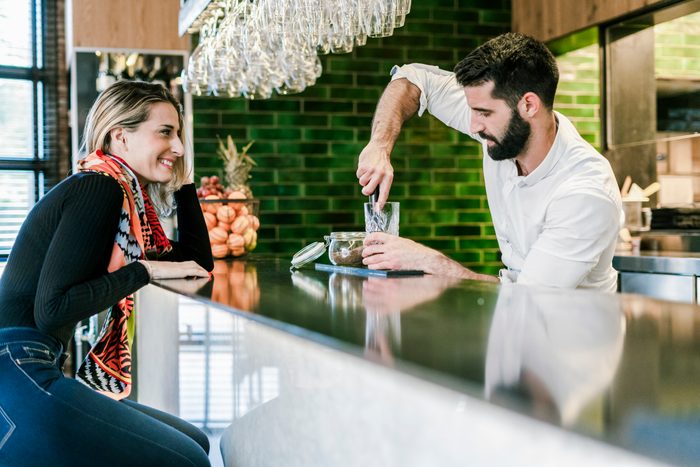
Asking them out
Did that cute bartender give you a special smile or touch your hand when giving your card back? Does that mean he or she likes you? Probably not. “We’re not into you. We’re not flirting with you. And we do not want to go home with you,” says Miner. “Being kind and nice is part of our job. That’s it.”
While we’re on the topic: Don’t ask what time they get off or where they live. That can come across as creepy and even threatening.
Do this instead: “Being polite and friendly is part of every customer-service job, and you should never read more into that,” Gottsman says. However, if you want to roll the dice on your own meet-cute story, it’s OK to give them your number on a napkin and leave the ball in their court, Miner says.

Reaching over or behind the bar to grab something quickly
Maybe you need an extra straw and spy an entire container of them behind the bar. Or maybe you’d just like an extra lemon, and it’s right there. Instead of wasting the busy bartender’s time, it’s fine to just quickly dart or reach behind the bar and grab what you need, right? “Wrong. Always wrong,” says Hernandez. “It’s already crowded back here, and we have things organized just so. Plus, if you put your dirty fingers into my fruit bin, I have to throw the whole thing out.”
Do this instead: If you need something from the bar, wait your turn and ask for it or flag down waitstaff or a busser if one is available, Swann says.

Buying a round of drinks
A round of drinks for your friends—cheers! Buying drinks for others is kind and fun, and the bartender will be more than happy to make it happen … as long as you know what everyone wants. “I love when someone volunteers, ‘I’m buying a round!'” says Joe. “But I cringe when they then turn around and say, ‘So, uh, what do you guys want?’ and I’m waiting 20 minutes for everyone to figure it out.”
Do this instead: “Be efficient and organized with your order,” Gottsman says. Talk to your group and figure out everyone’s orders before approaching the bar. At the bar, be prepared to order everyone’s drinks at once.
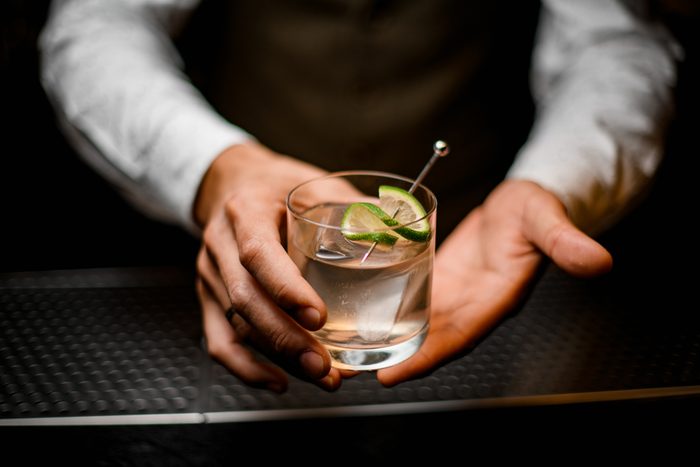
Asking them to “surprise you” with a drink
Asking the bartender, “What’s good here?” or saying, “Just surprise me with something good!” may be well intended—you’re trusting their educated opinion, after all. But alcohol preferences are so individual that all these statements really do is make the bartender play an uncomfortable guessing game trying to figure out what you like.
“When I first started, I used to ask a lot of questions, trying to help them narrow it down,” says Hernandez. “But now, I just joke, ‘Don’t worry, we took all the bad drinks off the menu already—you’re safe,’ and hopefully they’ll get the hint to just order something off our well-curated menu.” He adds that it’s incredibly frustrating to spend a lot of time explaining different cocktails, only to have the person order a beer.
Do this instead: Ideally, pick your drink yourself. After all, if you ask the bartender to surprise you and then hate the drink, things can get awkward. When you really want a suggestion, be specific by telling the bartender what kind of liquor or flavors you like.
If you truly want the bartender to surprise you, say that … but then be prepared to drink whatever it is without complaint, says Miner. Gottsman agrees that you shouldn’t send it back. “Don’t try to return the drink,” she says.

Requesting a custom cocktail or ordering off-menu
Some establishments are known for having mixologists who love to create custom drinks or make obscure drinks for people, and that’s part of their business, Swann says. You’ll find this more often in niche bars, like speakeasies. But you shouldn’t assume this is the case, as it’s a lot of work. Plus, “they may not have the recipe, ingredients or equipment to fulfill that request—or the time,” she says.
Do this instead: “If you want a special drink, look at the ‘specials’ menu; many bars offer seasonal or regional drinks,” Swann says. That said, it never hurts to ask the bartender if they will make you a custom drink, as long as you are polite and not pushy about it, she says.
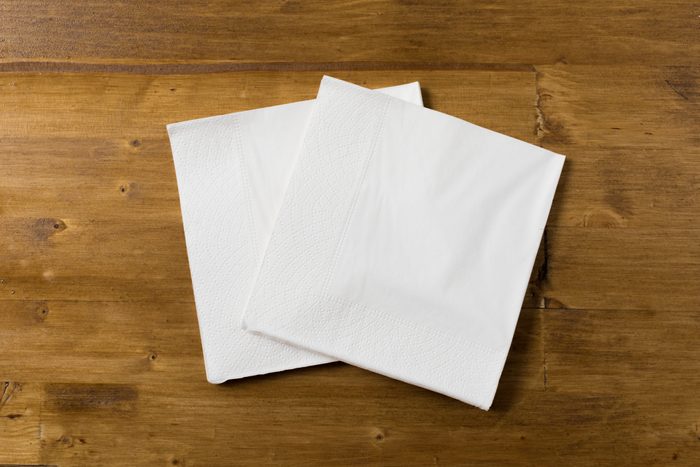
Using beverage napkins to clean up a spill
Spills happen, and grabbing a couple napkins to mop up drips is a great idea. What’s not? “Grabbing the entire stack of cocktail napkins off the bar and throwing it on a large puddle,” says Hernandez. “I appreciate the help, but we have bar mops and rags for exactly this purpose, and those cocktail napkins are pricey.”
Do this instead: Flag down a server, busser, host or bartender, and explain the situation, Swann says. They’ll bring out the cleaning supplies.
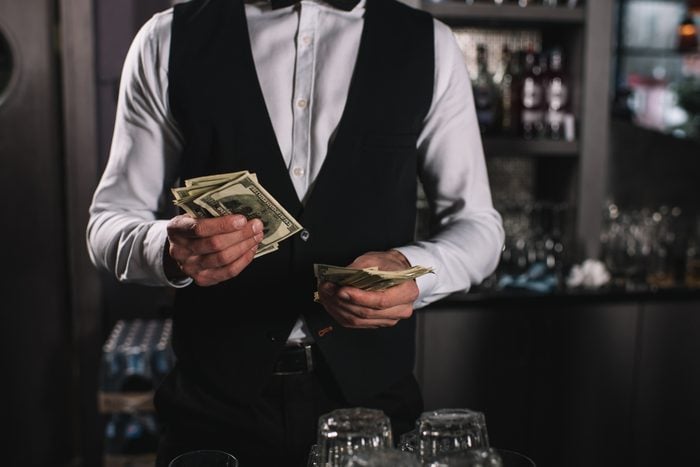
Handing them a wad of cash
On busy nights, you might think it would make sense to hand the bartender cash and let them close out the bill when they have a spare minute. But this isn’t as good of an idea as you think it is. “Sometimes people will just hand me a ball of cash and be like, ‘This is for the bill—keep the rest for your tip,'” says Joe. “And these are usually the people who end up stiffing us money.” Even if you’re not trying to be dishonest, it’s easy to make a mistake calculating the bill plus tip.
Do this instead: Hand the bartender cash, and wait for them to count it and close the tab, Gottsman says. Then offer a tip.

Getting creative with the tip
Our bartenders say they’ve been given tips folded into origami shapes, rolled and placed in a glass, and attached to a phone number from a hopeful suitor. While these can be cute, they ultimately cause more frustration for the bartender, as they take extra time to get into a usable form, Gottsman says. Sometimes people leave a tip of fake money that turns out to be an advertisement or a Bible verse when opened—this is incredibly rude and disrespectful.
Do this instead: “Expect to tip $1 per beer, $2 to $3 for a cocktail or 20% of the final tab,” Gottsman says. Note: Tipping etiquette will be different depending on where you are and the type of bar it is. For instance, you generally won’t be expected to tip at an all-inclusive resort, though it can still be a nice gesture.

Not bothering them with safety concerns
You may not want to bother the bartender with extra concerns beyond making drinks—especially if the line to the bar is three people deep—but it’s always good bar etiquette to bring certain things to the bartender’s attention, Swann says. “If you see someone slip something into someone else’s drink, alert me or the other staff immediately,” says Mitchell Allen, a hotel and catering bartender in Seattle. Other things you should tell your bartender about: first-aid issues, health emergencies and if you need help getting home safely.
Do this instead: When you spot a safety concern, alert the bartender or another staff member immediately, Swann says. “Guests’ comfort and safety is always our top priority,” Allen adds.

Keeping things simple without a menu
Skipping the menu keeps things simple for you and the bartender … as long as you know exactly what you want. “People will come in and say, ‘Oh, I don’t need a menu—I’m not here for anything fancy,’ and then say, ‘What beers do you have?’ But that’s the point of the menu,” says Allen. “We have 20 rotating beers on tap, and I don’t want to have to recite them every time.”
Do this instead: If you know exactly what you want, order it right away. If you’re unsure, look at the menu before asking questions. Or decide on your drink before you reach the venue. “Many places have online menus now, so if you don’t want to take the time at the bar to read the menu, you can look it up in advance,” Gottsman says.
About the experts
|
Why trust us
Reader’s Digest has published hundreds of etiquette stories that help readers navigate communication in a changing world. We regularly cover topics such as the best messages to send for any occasion, polite habits that aren’t as polite as they seem, email and texting etiquette, business etiquette, tipping etiquette, travel etiquette and more. We’re committed to producing high-quality content by writers with expertise and experience in their field in consultation with relevant, qualified experts. We rely on reputable primary sources, including government and professional organizations and academic institutions, as well as our writers’ personal experiences where appropriate. We verify all facts and data, back them with credible sourcing and revisit them over time to ensure they remain accurate and up to date. For this piece on bar etiquette, Charlotte Hilton Andersen tapped her experience as a longtime journalist who specializes in etiquette and communication for Reader’s Digest. Read more about our team, our contributors and our editorial policies.
Sources:
- Elaine Swann, etiquette expert and founder of the Swann School of Protocol; phone interview, July 22, 2024
- Diane Gottsman, MS, national etiquette expert, author of Modern Etiquette for a Better Life and founder of the Protocol School of Texas; phone interview, July 24, 2024
- Lea Miner, bartender at a restaurant in Colorado; interview, May 2023
- Antonio Hernandez, bartender at a speakeasy in Manhattan; interview, May 2023
- Mary Joe, bartender at a sports bar in Minneapolis; interview, May 2023
- Mitchell Allen, hotel and catering bartender in Seattle; interview, May 2023
